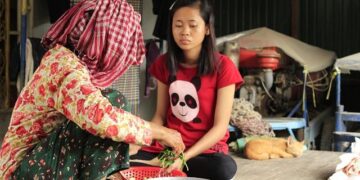Myanmar’s Crisis Deepens: Navigating Fragmentation, Narcotics, and Financial Crime
Situated in Southeast Asia, Myanmar is currently engulfed in a multifaceted crisis that threatens to unravel its social and political fabric. Since the military takeover in February 2021, the nation has spiraled into escalating disorder characterized by deepening political divisions, a surge in drug manufacturing, and rampant money laundering. The ruling military regime faces mounting challenges as ethnic conflicts intensify and an expanding underground economy flourishes. Meanwhile, ordinary citizens endure the harsh consequences of this turmoil. This article examines the intricate factors fueling Myanmar’s instability and highlights their broader repercussions on regional security and international diplomacy. Drawing from expert perspectives and field reports, we emphasize the urgent necessity for a unified global response to tackle these intertwined issues.
Roots of Myanmar’s Enduring Instability: Ethnic Divisions and Economic Struggles
Myanmar’s ongoing unrest extends far beyond political grievances; it is deeply rooted in longstanding ethnic tensions, economic hardships, and illicit enterprises that have become entrenched over decades. Numerous armed ethnic factions continue to contest for territorial control and autonomy across various regions—particularly in borderlands rich with natural resources—fueling persistent conflict.
The country remains one of Asia’s largest producers of opium poppies—a key driver behind both local economies and armed group financing—with estimates suggesting that narcotics contribute up to 15% of Myanmar’s informal GDP as of 2023. This lucrative trade not only sustains insurgencies but also undermines efforts toward national unity by exacerbating mistrust among communities.
Compounding these challenges is an absence of cohesive national identity or inclusive governance structures capable of bridging divides. Criminal networks exploit this fragmentation by embedding themselves within weak institutions to expand their influence.
Moreover, money laundering schemes have surged following international sanctions imposed post-coup. The largely unregulated financial environment enables illicit capital flows involving both domestic actors seeking refuge from scrutiny as well as foreign criminal syndicates capitalizing on porous borders.
| Key Factor | Consequences |
|---|---|
| Ethnic Armed Conflicts | Mass displacement & intercommunal violence disrupting social cohesion. |
| Narcotics Production & Trafficking | Empowerment of militias & corruption permeating government ranks. |
| Money Laundering Networks | Erosion of legitimate economic systems facilitating further criminality. |
Escalation of Drug Trade Amid Political Chaos – Threats Beyond Borders
The narcotics industry within Myanmar has expanded dramatically amid ongoing instability—serving as a critical funding source for various armed groups who exert de facto control over large swaths of territory. These factions often impose their own rules through coercion while obstructing peace negotiations between conflicting parties.
This dynamic transforms border areas into contested zones where dominance over drug trafficking routes frequently outweighs loyalty to central authorities or peace accords—a situation reminiscent not unlike Colombia’s internal conflicts during its peak cocaine wars but now unfolding across Southeast Asia’s Golden Triangle region (Myanmar-Laos-Thailand).
The ripple effects extend beyond Myanmar itself:
- Cross-border smuggling: Neighboring nations face surges in organized crime syndicates exploiting porous frontiers for narcotic distribution networks stretching into China, India, Thailand, and beyond.
- Public health emergencies: Rising addiction rates strain healthcare infrastructures already weakened by COVID-19 impacts—compromising societal resilience against future crises.
- Tensions among states: Countries bordering Myanmar grapple with balancing stringent border controls while managing internal socio-political pressures (see recent diplomatic strains involving China).
This volatile environment hampers regional cooperation frameworks such as ASEAN initiatives aimed at fostering stability through dialogue rather than militarized responses (long-term socioeconomic strategies are essential here). Addressing these complex threats requires integrated policies combining security measures with sustainable development goals targeting root causes like poverty reduction alongside law enforcement reforms.
Strategic Approaches to Combat Money Laundering & Strengthen Governance Structures
Tackling Myanmar’s intertwined crises demands comprehensive reforms focused on tightening financial oversight mechanisms alongside rebuilding trust within governance institutions undermined by years of conflict.
Key strategic priorities include:
- Modernizing Anti-Money Laundering Frameworks: Updating legislation consistent with Financial Action Task Force (FATF) recommendations ensures banks adopt stringent due diligence processes preventing illicit fund flows linked to narcotics profits or corrupt officials’ assets movements.
- Cultivating Specialized Law Enforcement Capacities: Equipping police forces with advanced investigative tools—including forensic accounting expertise—to dismantle sophisticated laundering operations effectively across jurisdictions;
- Nurturing Public-Private Synergies: Facilitating partnerships between governmental bodies, private sector entities (especially banking), NGOs focused on transparency advocacy fosters holistic approaches combating financial crimes;
A parallel focus must be placed on restoring accountable governance through participatory mechanisms engaging diverse ethnic communities affected by conflict:
- Pioneering Transparent Administrative Practices: Instituting open budget disclosures coupled with independent audits enhances public confidence;
- Energizing Civil Society Oversight Roles: Empowering watchdog organizations strengthens checks against misuse or diversion within state apparatuses;
- Pursuing Inclusive International Engagements:Promoting sustained dialogues between Yangon authorities (where feasible) alongside UN agencies facilitates knowledge exchange regarding anti-corruption best practices tailored for fragile contexts;
< / ul >Conclusion : Navigating Toward Stability Amidst Complex Challenges
< p > As Myanmar confronts an unprecedented convergence of fragmentation fueled by entrenched ethnic strife , booming drug markets ,and pervasive money-laundering networks ,the global community stands at a pivotal crossroads .The compounded effects have precipitated severe humanitarian distress while isolating the nation diplomatically .The analysis presented underscores how piecemeal interventions fall short without coordinated multilateral engagement prioritizing long-term peacebuilding , institutional reform ,and socioeconomic inclusion .Without such concerted efforts , prospects for meaningful recovery remain tenuous at best .Moving forward requires all stakeholders —from regional powers to international organizations—to acknowledge complexity rather than oversimplify solutions,and commit resources toward collaborative pathways centered around safeguarding human dignity throughout Myanmar ’ s diverse populations .Though fraught with obstacles,the imperative remains clear : failure is not an option when so much depends upon it .< / p >














